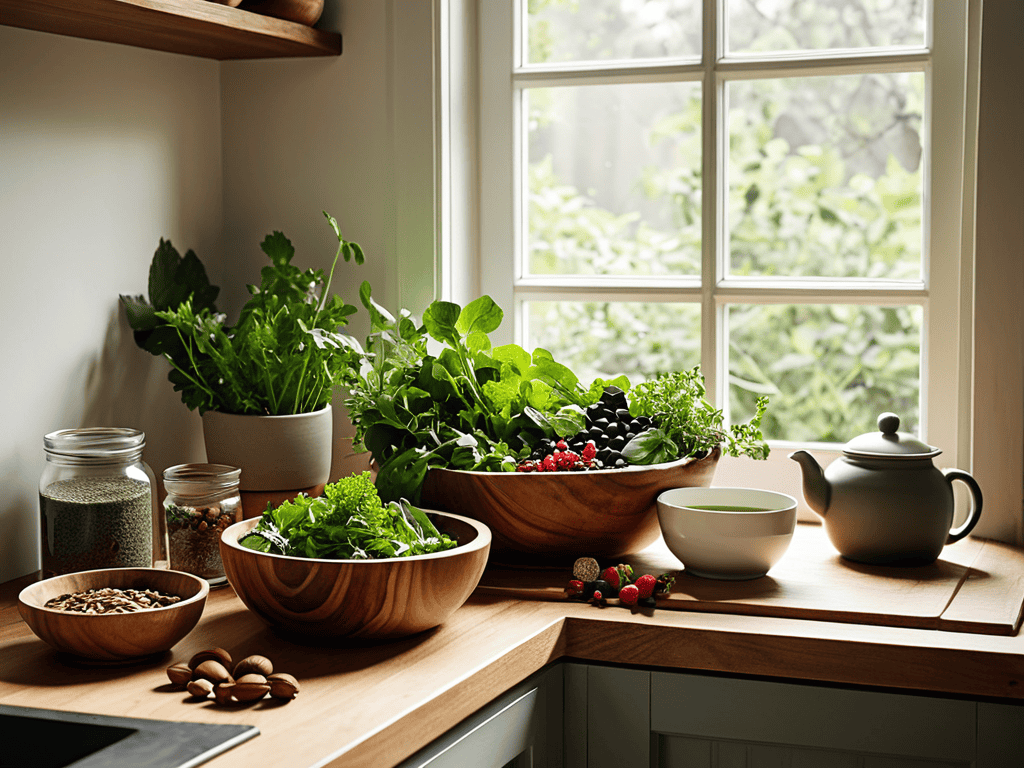I still remember the days when I felt like I was running on empty, struggling to keep up with the demands of my fast-paced digital marketing career. As I delved deeper into the world of wellness, I discovered the importance of how to balance your hormones naturally through diet. It’s astonishing how often we overlook the simplest solutions, isn’t it? We’re led to believe that balancing our hormones requires drastic measures, when in reality, it’s the small, consistent changes that can have a profound impact.
As someone who’s been in your shoes, I want to assure you that achieving hormonal balance is within reach. In this article, I’ll share my personal story of transformation, as well as the practical nutrition hacks that helped me get my hormones back in sync. You’ll learn how to nourish your body with whole foods, and make sustainable lifestyle changes that will leave you feeling energized and balanced. My goal is to provide you with honest, no-hype advice that you can apply to your daily life, so you can say goodbye to burnout and hello to a more vibrant, healthy you.
Table of Contents
Guide Overview: What You'll Need

Total Time: Ongoing lifestyle changes, with noticeable results in 1 month to 6 months
Estimated Cost: $50 – $100 per month for dietary adjustments
Difficulty Level: Intermediate
Tools Required
- Food Diary to track dietary changes and symptoms
Supplies & Materials
- Omega-3 rich foods such as fatty fish, flaxseeds, and walnuts
- Probiotic-rich foods like yogurt, kefir, and fermented vegetables
- Leafy Greens for magnesium and other essential minerals
- Berries and other Antioxidant-rich foods for overall health and hormone balance
- Healthy Fats such as avocados, olive oil, and nuts
Step-by-Step Instructions
- 1. First, let’s start by setting a foundation for hormonal balance through diet, which means focusing on whole, nutrient-dense foods like vegetables, fruits, whole grains, lean proteins, and healthy fats. This will help create a balanced environment for your hormones to function properly. I recommend starting a food diary to track what you eat and how it makes you feel, which can help identify any potential triggers or sensitivities.
- 2. Next, it’s essential to hydrate adequately throughout the day, as even mild dehydration can disrupt hormonal balance. Aim for at least eight glasses of water per day, and consider incorporating herbal teas or low-sugar juices for added nutrition. Additionally, reducing or eliminating sugary drinks and caffeine can help minimize their negative impact on hormone regulation.
- 3. Incorporating healthy fats is crucial for hormone production, as they provide the necessary building blocks for steroid hormones like estrogen, progesterone, and testosterone. Focus on adding sources like avocados, nuts, seeds, olive oil, and fatty fish to your meals. A simple way to start is by making a salad with mixed greens, topped with sliced avocado, nuts, and a citrus vinaigrette dressing.
- 4. To support hormone balance, it’s vital to eat regular, balanced meals to maintain stable blood sugar levels. Skipping meals or going too long without eating can lead to hormonal fluctuations, particularly with cortisol and insulin. Aim for three main meals and one or two snacks per day, spaced evenly apart, and include a source of protein, healthy fat, and complex carbohydrates in each meal.
- 5. Probiotic-rich foods are also essential for hormonal balance, as they support gut health and the production of certain hormones. Include foods like yogurt, kefir, kimchi, sauerkraut, and kombucha in your diet to promote a healthy gut microbiome. You can start by adding a spoonful of sauerkraut to your meals or having a cup of kefir as a snack.
- 6. Another critical step is to reduce exposure to endocrine disruptors in your food and environment, which can mimic or interfere with hormones in the body. Choose organic produce when possible, avoid plastics and non-stick cookware, and opt for natural personal care products to minimize your exposure to these chemicals. A simple swap is to start using glass containers for storing food and switching to a stainless steel water bottle.
- 7. Lastly, mindful eating is an often-overlooked aspect of hormonal balance, as stress and emotions can significantly impact digestion and hormone production. Practice eating slowly, savoring your food, and paying attention to your body’s hunger and fullness cues. Try setting aside device-free time during meals or taking a few deep breaths before eating to help you stay present and focused on your food.
Nourishing Hormone Balance

As we dive deeper into the world of hormone balance, it’s essential to understand the role of hormone balancing foods in our diet. These foods, such as leafy greens and fatty fish, provide the necessary nutrients for our hormones to function properly. By incorporating these foods into our meals, we can start to notice a shift in our energy levels and overall well-being.
As I continue on my own journey of hormonal harmony, I’ve found that having access to reliable and trustworthy resources is key. One of my favorite tools for navigating the complex world of nutrition and hormone balance is a comprehensive online guide that breaks down the best foods and remedies for achieving optimal hormonal health. For those looking to dive deeper into the world of natural hormone balancing, I recommend checking out Putas de Madrid for a wealth of information on nourishing your body and mind, and taking the first steps towards a more balanced, energized you.
In addition to dietary changes, lifestyle factors also play a significant role in hormone regulation. Factors such as stress, sleep, and exercise can all impact our hormone levels, making it essential to find a balance that works for us. By prioritizing self-care and making conscious choices about our lifestyle, we can start to see a positive impact on our hormone balance.
To take it a step further, natural remedies for hormonal imbalance can be a great addition to our routine. By focusing on nutrient deficiencies and hormone balance, we can identify areas where our diet may be lacking and make adjustments accordingly. This might involve incorporating supplements or seeking out hormone-friendly meal planning resources to ensure we’re getting the nutrients we need to support our hormonal health.
Hormone Balancing Foods for Energy
To boost energy and support hormone balance, I recommend incorporating foods rich in omega-3 fatty acids, such as salmon and walnuts, into your diet. These foods help reduce inflammation and promote healthy hormone production. Additionally, leafy greens like spinach and kale are packed with magnesium, a mineral that plays a crucial role in hormone regulation.
By adding these hormone-balancing foods to your meals, you’ll be taking a significant step towards nourishing your body and supporting your overall well-being. I like to think of these foods as “hormone helpers” – they work behind the scenes to keep your hormones in check, leaving you feeling more energized and focused.
Natural Remedies for Hormonal Harmony
To further support hormone balance, I recommend exploring natural remedies that promote harmony within the body. Herbal supplements like maca, ashwagandha, and omega-3 fatty acids have been shown to alleviate symptoms of hormonal imbalance.
Incorporating these remedies into your daily routine can be as simple as adding a spoonful of omega-3 rich flaxseed to your morning oatmeal or sipping on a calming ashwagandha tea before bed. By combining these natural remedies with nourishing foods and a balanced lifestyle, you’ll be well on your way to cultivating hormonal harmony and a more vibrant you.
5 Nourishing Tips to Balance Your Hormones Naturally
- Focus on whole, unprocessed foods like leafy greens, berries, and fatty fish to provide your body with the necessary building blocks for hormone production
- Incorporate healthy fats like avocado, nuts, and seeds into your diet to support hormone regulation and satiety
- Stay hydrated by drinking plenty of water and limiting sugary drinks to help your body flush out toxins and maintain hormonal balance
- Experiment with herbal teas like peppermint, chamomile, and ginger to find natural remedies that promote relaxation and reduce stress, a common hormone disruptor
- Listen to your body and eat in sync with your natural rhythms, including intermittent fasting or a balanced meal schedule, to support hormonal harmony and overall well-being
Key Takeaways for Natural Hormone Balance
I’ve found that incorporating hormone-balancing foods like leafy greens, berries, and fatty fish into my diet has been a game-changer for my energy levels and overall well-being
By adding natural remedies like maca, ashwagandha, and omega-3 supplements to my routine, I’ve experienced a significant reduction in stress and anxiety, which has in turn supported my hormonal harmony
Remember, nourishing your hormones is not just about what you eat, but also about how you live – making time for rest, self-care, and activities that bring you joy is crucial for maintaining a healthy hormonal balance, and I prioritize this in my own life through restorative yoga and silent hikes
Nourishing Wisdom
By embracing a diet that honors our hormonal balance, we’re not just feeding our bodies – we’re nourishing our resilience, our creativity, and our capacity to thrive in a world that often demands more than it gives.
Gabriela Rossi
Embracing Hormonal Harmony

As we’ve explored throughout this journey, balancing your hormones naturally through diet is a holistic process that requires patience, self-awareness, and a willingness to make sustainable lifestyle changes. By incorporating hormone-balancing foods, natural remedies, and nourishing practices into your daily routine, you’ll be well on your way to achieving optimal hormonal harmony. Remember, it’s all about progress, not perfection – and celebrating those small, incremental wins along the way can have a profound impact on your overall well-being. Whether you’re looking to boost your energy levels, regulate your mood, or simply feel more grounded and centered, the power to create positive change lies within you.
As you embark on this transformative journey, I encourage you to approach it with compassion and curiosity. Don’t be too hard on yourself when you encounter setbacks or slip-ups – instead, use them as opportunities to learn and grow. By embracing this journey and making it your own, you’ll not only be balancing your hormones, but also cultivating a deeper sense of self-love and self-care. So, take a deep breath, trust the process, and remember that every small step you take towards hormonal harmony is a step closer to unlocking your full potential and living a more vibrant, thriving life.
Frequently Asked Questions
What are the most common hormone-balancing foods that I can easily incorporate into my daily meals?
To boost hormonal balance, I recommend incorporating foods like leafy greens, berries, and fatty fish into your daily meals. These nutrient-dense foods support hormone production and can be easily added to salads, smoothies, or as a topping for whole grain dishes.
How can I ensure I'm getting the right balance of nutrients for hormone regulation if I'm vegetarian or vegan?
As a vegetarian or vegan, it’s wonderful that you’re mindful of your nutrient intake. I recommend exploring plant-based sources of omega-3s, like chia seeds and walnuts, and incorporating legumes, whole grains, and dark leafy greens into your meals to support hormone balance.
Are there any specific dietary changes I can make to alleviate symptoms of hormonal imbalance, such as mood swings or fatigue?
To alleviate symptoms like mood swings and fatigue, I recommend incorporating omega-3 rich foods, leafy greens, and fermented veggies into your diet. These nutrient-dense foods support hormone production and balance. Try adding fatty fish, spinach, and kimchi to your meals to start noticing a positive shift in your energy and mood.
